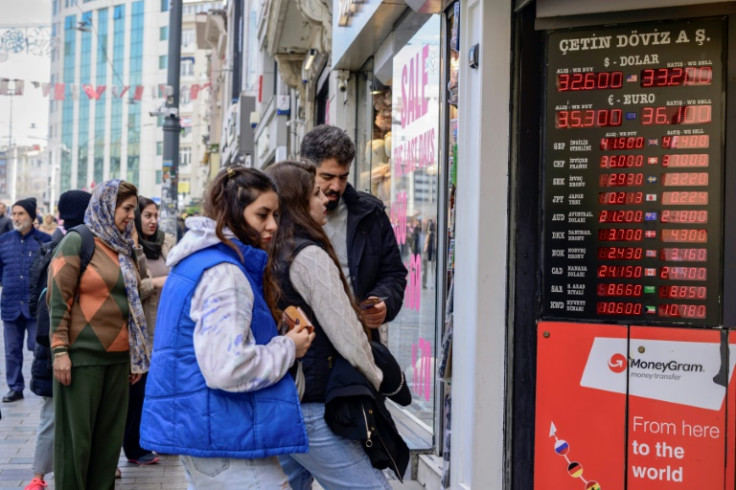Turkey's Central Bank Hikes Interest Rate To 50%

Turkey's central bank hiked its key interest rate on Thursday, resuming its tightening cycle as one of the world's highest inflation rates rose again last month.
The bank's monetary policy committee decided to raise the policy rate from 45 percent to 50 percent, with a statement citing "the deterioration in the inflation outlook".
The central bank had declared that its hike in January would be its last as the level was sufficient to start easing the cost-of-living crisis.
But annual inflation rose again in February, reaching 67.1 percent.
The bank had kept its interest rate unchanged in February after having raised it from 8.5 percent to 45 percent since June.
The central bank said Thursday that its "monetary policy stance will be tightened in case a significant and persistent deterioration in inflation is foreseen".
"Hugely positive move" by the central bank hiking against expectations, emerging markets economist Timothy Ash remarked in emailed comments.
He said it showed the economy team led by Finance Minister Mehmet Simsek and the central bank has been given "a strong mandate to do whatever its takes to fight inflation."
"They are proving their independence now," Ash commented.
Economists say pressure on Turkish policymakers is building ahead of local elections on March 31 as capital inflows have slowed and foreign exchange reserves are falling again.
The economic crisis nearly cost Erdogan his re-election last May.
He won after showering his supporters with massive pay increases and introducing an early retirement programme that cost the government billions of dollars.
Inflation is a thorn in the side of President Recep Tayyip Erdogan in the run up to the elections as his ruling AKP party is seeking to win back control of major cities, especially Istanbul, currently held by the main opposition party.
In a public rally in western Turkey on Wednesday, Erdogan admitted that high inflation was a challenge for the government.
"Today we are tested by the high cost of living and as a result the loss of welfare of our people with fixed income," he said.
But he assured that as inflation slows down, employees and pensioners would benefit from the positive outlook in economy.
"We will overcome all these," he said.
Liam Peach, senior emerging markets economist at Capital Economics, said Thursday's decision left open the possibility of another rate hike in April with the potential for a faster pace of lira depreciation after the local elections and strong inflation.
Peach suggested that the bank has burned through billions of dollars of foreign currency reserves in recent months to stabilise the lira.
"From that perspective there are some question marks. But even so, the decision to respond so quickly to the recent strong inflation figures and hike rates before the local elections is clearly a very encouraging signal for the policy shift," he said.
© Copyright AFP {{Year}}. All rights reserved.





















